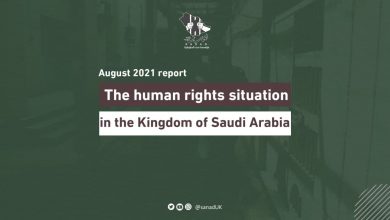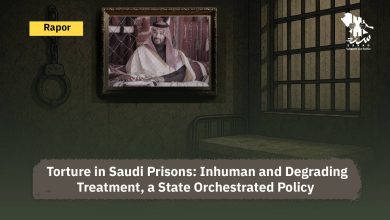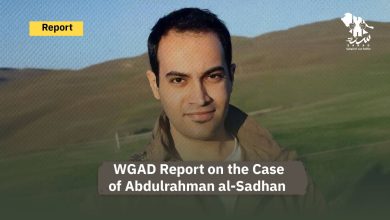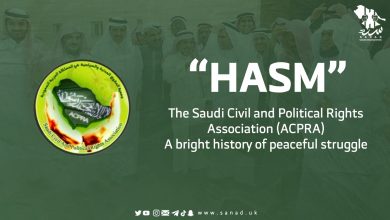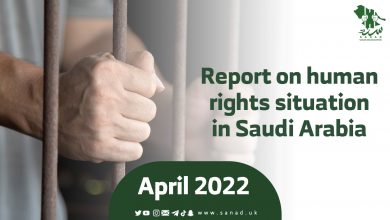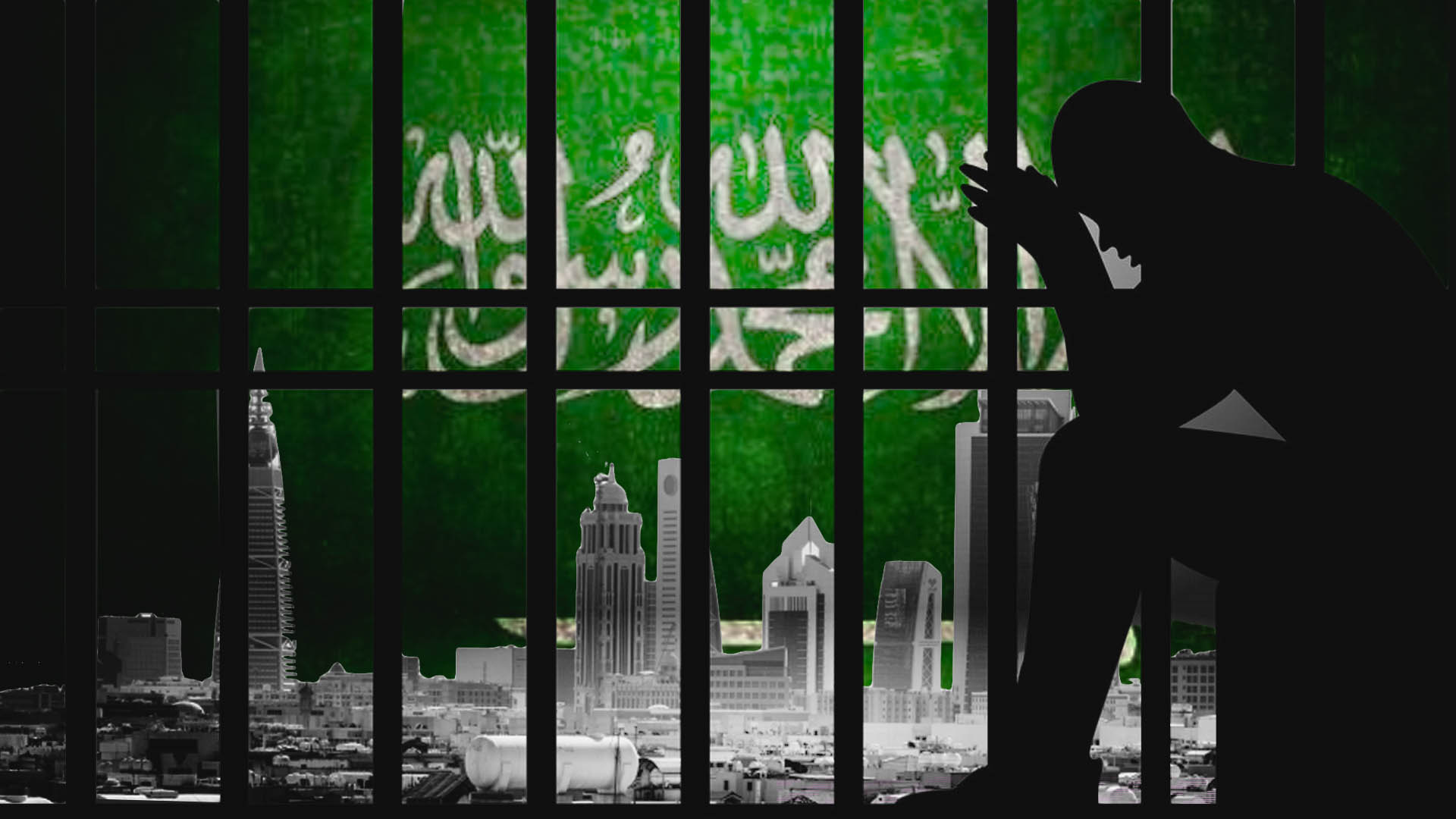
Enforced disappearance in Saudi Arabia
To express your opinion on any political or social issue in Saudi Arabia in a manner that does not conform with the authorities and can expose you to arrest and imprisonment without your family and friends being informed. In fact, being a social influencer and not advocating for the authorities might cause your sudden disappearance from the face of this earth without any information about you for months, and maybe even years. If your destiny lands you in the hands of a tough warden, you may die, and no one will find a trace of you.
Indeed, this has happened with several activists, advocates and influencers. For example, Turki al-Jasser who disappeared in 2017 and his location remains a mystery until this day; and before him Sulaiman al-Dwaish was detained in 2015, and Noha al-Balawi, who disappeared for more than a year before her family learnt that she was in Saudi prisons because she expressed her rejection to her country’s normalisation with Israel. International human rights organisations confirm that more than 60 people from amongst intellectuals, activists, royal princes and businessmen have forcibly disappeared in Saudi.
It seems that the era of Salman and his son is the worst and the darkest with regards to human rights and arbitrary arrests in Saudi. Moreover, enforced disappearances have become cross-border where Saudi intelligence have kidnapped some people from European and Arab countries, such as Prince Turki bin Bander and Saud bin Saif Alnasr. Even worse is that some people arriving in Saudi airports have been arrested upon arrival because they had expressed opinions on a cause concerning Saudi.
Despite the constant demands of international human rights organisations for Saudi to respect human rights, it continues to practice the most heinous violations. This is despite the authority attempting to promote social reforms that have no real goal other than seeking to improve the bad reputation of Saudi Arabia before the world, and before its citizens, who today fear the brutality of the authority’s repression more than ever.
Amnesty International recently expressed its worries regarding the situation by stating that, “the presence of human rights activists in Saudi Arabia today is threatened as they are disappearing one after the other”. In the same context, at the end of last month, two British lawyers demanded the suspension of Saudi Arabia’s membership in the United Nations Human Rights Council due to human rights violations, including the arrest or enforced disappearance of activists, including human rights activists.
The numbers of detainees or disappeared persons multiplied day by day in 2020, all of whom are fighting for human rights and dignity in a country that does not recognise democracy and freedom except for what it sees in movies and reads cautiously about on the internet.
There is hardly any detainee who entered the prisons of the Saudi regime and did not undergo the bitter experience of enforced disappearance. This is the way Saudi authorities receive many of them, which confirms that it is a systematic policy and not an action taken by some individuals.
According to the International Convention for the Protection of All Persons from Enforced Disappearance, enforced disappearance is considered to be, “the arrest, detention, abduction or any other form of deprivation of liberty by agents of the State or by persons or groups of persons acting with the authorisation, support or acquiescence of the State, followed by a refusal to acknowledge the deprivation of liberty or by concealment of the fate or whereabouts of the disappeared person, which place such a person outside the protection of the law.”
ALQST organisation documented five cases of enforced disappearance in Saudi Arabia in its report at the beginning of 2019. Moreover, the European-Saudi Organisation for Human Rights has stated in more than one report the enforced disappearances in Saudi Arabia and concerns about the fate of the disappeared persons, while Human Rights Watch said in one of its reports that arbitrary detention affects thousands in Saudi Arabia.
The dealings of the international community with enforced disappearance in Saudi Arabia:
Despite the enormity of the issue of enforced disappearance in Saudi Arabia, it has not taken up much space with the international community. The Working Group on Enforced or Involuntary Disappearances of the Human Rights Council has only sent seven cases to Saudi Arabia since 2011 and until today, in which the Saudi authorities are held accountable for the fate of individuals who were subjected to enforced disappearance, as well as questions about the use of anti-terrorism law to justify enforced disappearances.
Among the complaints sent to the Saudi government were the cases of 17 citizens facing the death penalty despite the many violations they were subjected to, including enforced disappearance.
Furthermore, one of the letters referred to the cases of human rights defenders who were subjected to arrest and enforced disappearance, namely Iman al-Nafjan, Lujain al-Hathloul and Muhammad al-Bajadi. Also sent to the Saudi government was the case about human rights defender Khaled al-Omair.
The Working Group dealing with complaints also sent a complaint to the Saudi authorities about the Saudi journalist Jamal Khashoggi, and another about the five detainees involved in the case of his murder. Another complaint was filed about the enforced disappearance of Yemeni journalist Marwan Ali Naji Al-Muraisi.
The Saudi practices appear in the periodic reports of the Working Group, and it shows that the government has not responded to any of these complaints or the questions.
Among the cases the Working Group dealt with was the case of the preacher Suleiman al-Duwaish, whose fate is still unknown despite the passing of three years since his disappearance. In July 2017, the Working Group wrote to the Saudi government about the case of Al-Duwaish. However, Saudi authorities continue to dubiously ignore these complaints, especially in light of information that circulated on social networks which stated that he was killed under torture, without any official denial or confirmation according to a report by the Saudi European Organisation for Human Rights.
Likewise were the cases of enforced disappearance of Qatari citizens following the outbreak of the Gulf crisis between the two countries. The Qatari Human Rights Committee said in a statement last August that it had received “confirmed information from reliable sources regarding the enforced disappearance of the Qatari citizen Ali Nasir Ali Jarallah (70 years old), along with his son Abdul Hadi (17 years) in Saudi Arabia, who entered Saudi Arabia with a family permit last Thursday”.
The committee stated that Jarallah and his son were both forcibly disappeared the previous Sunday at 1pm (local time) in the East provenance in Saudi Arabia. They were arrested by the Saudi authorities and detained in an unknown location according to Anadolu agency’s report.
It also stated that: “The Saudi authorities have recently pursued a policy of enforced disappearance of Qatari citizens because of the political crisis which contradicts all international and regional conventions.”
Saudi authorities are still arbitrary with its citizens and many of its residents, using the method of enforced disappearance to terrorise opponents and their families, amid international let-down and human rights calls for more pressure on the Saudi regime to reveal the fate of many of the forcibly disappeared.
The International Council for Supporting Fair Trial and Human Rights notes that the disappearance of journalist Jamal Khashoggi is nothing but a continuation of previously disappeared operations which continue, and that this investigation should not include Khashoggi alone.
It is the duty of the Saudi authorities to provide information about the Saudi (Qatari) Prince, Nawaf Talal al-Rasheed, who was reported to have disappeared since his deportation from Kuwait on May 12, 2018; and if he was arrested, to clarify the reasons for his arrest, his whereabouts, and his fate. Some sources report that he was assassinated the day after his abduction.
There are many others who were forcibly disappeared inside Saudi Arabia and are deprived of the right to legal representation, the right to know the reason for their arrest, the nature of the charges against them, the right to communicate with their families and to appear before courts that guarantee a fair trial.
The International Council for Supporting a Fair Trial and Human Rights calls upon The Working Group on Enforced Disappearances, the UN Special Rapporteur on Freedom of Expression, and the UN Special Rapporteur on Execution, to conduct a comprehensive investigation into human rights violations and crimes in Saudi Arabia, as silence about them has become the biggest crime. It also emphasises that any report the Saudi authorities issue to acquit themselves cannot be trusted.
The Council also calls for the suspension of Saudi Arabia’s membership in the Human Rights Council due to the deterioration of its human rights record inside and outside the country. The massacres committed against the Yemeni people is the biggest testament to its ineligibility to be in that sacred place for human rights.
MENA Rights Group submitted a general allegation to the UN Working Group on Enforced or Involuntary Disappearances highlighting the obstacles that prevent the implementation of the 1992 General Declaration on the Protection of All Persons from Enforced Disappearance in Saudi Arabia.
In recent years, there has been a sharp increase in the number of enforced disappearances, indicating that this practice has become widespread in Saudi Arabia. Some individuals disappear for short periods following their arrest, while others remain for several months or years, during which their families are denied any information about their fate and whereabouts. Moreover, authorities continue to face peaceful demonstrations or expression of opinion with detention and systematic arrests. Many human rights defenders, journalists and all those who openly criticised government policies were subjected to enforced disappearance as a form of revenge and a means of silencing their voices.
When there are concerns about the practice of enforced disappearance in a country, a public allegation can be submitted to the UN Working Group on Enforced or Involuntary Disappearances, which is then referred to the country concerned for comment. In its report submitted to the UN Panel of Experts on 20 December 2019, MENA Rights Group indicated in its claim that (1) current legislation does not provide adequate protection against enforced disappearance, (2) the increased and unrestricted concentration of power with the royal monarchy has contributed to a culture of impunity, and (3) Rules and practices relating to the investigation encourages the continuation of the disappearance practice.
Systematic practice
Although the extent of enforced disappearance in Saudi Arabia is shrouded in secrecy, information obtained indicates that there is a clear trend to practice enforced disappearance in the short and long term.
Prosecution determine how the arrests carried out by the intelligence services follow a specific protocol. Often the victims are arrested by plain clothes officers who neither present an arrest warrant nor explain the reason for their arrest. Then they are transported to unknown locations where they are forcibly hidden for a few days or several years. Cases indicate that, in many instances, the crime of enforced disappearance is systematically committed in Saudi Arabia to obtain coerced confessions, which are then used as the only evidence to charge and punish individuals at a later time. A culture of impunity facilitates these practices, which prevents the General Declaration on the Protection of All Persons from Enforced Disappearance from being implemented.
The documented cases also show that the practice of holding individuals incommunicado in Saudi Arabia often amounts to enforced disappearance because it is characterised by the scarcity of official information regarding an individual’s whereabouts, ill-treatment and torture (often used as a means of interrogation), and lack of access to legal representation. MENA Rights Group stressed in its general claim that the prisoner database on the internet (Nafitha) failed to fulfil the provisions of Article 10 of the Declaration.
MENA Rights Group noted that available remedies and the fear of reprisal do not allow for the practice of enforced disappearance to be addressed, which undermines the implementation of the Declaration.
Institutions and legislations
Saudi Arabia is ruled by an absolute theocratic monarchy, and power has become increasingly centralised in recent years as a result of restructuring the country’s public prosecution and security services.
The public prosecution warns of the limited safeguards in domestic law to prevent enforced disappearances, and the absence of a specific definition criminalising enforced disappearance, contrary to what is stated in Article 4 of the General Declaration on the Protection of All Persons from Enforced Disappearance. In its public allegation, MENA Rights Group also raised concerns to the Committee against Torture that current legislation is inadequate and not respected, as stipulated in its 2016 concluding observations.
Moreover, anti-terrorism legislation has been used extensively in recent years to criminalise a wide range of acts, including those that fall under the rights to freedom of opinion and expression, peaceful assembly and establishing associations, as well as freedom of thought, conscience, and religion.
The prosecution also drew attention to the fact that the 2017 Anti-Terrorism Law grants significant discretionary powers to the Presidency of State Security and the Public Prosecution Office, allowing incommunicado detention of individuals for up to 90 days, without any contact with the outside world. The law also grants the Specialised Criminal Court (SCC) the authority to extend the period of detention indefinitely, including solitary confinement, which puts individuals at risk of disappearance.
The public prosecution also touched on the lack of legal certainty in Saudi Arabia, which contributes to the creation of a climate of fear and self-censorship. They stressed that the failure to ratify many of the basic international human rights conventions, including the International Covenant on Civil and Political Rights and the International Convention for the Protection of All Persons from Enforced Disappearance, leaves only limited means to investigate the crime of enforced disappearance and prosecute its perpetrators in Saudi Arabia.
Recommendations
In its general claim, MENA Rights Group recommended that the Saudi government prevents the perpetration of enforced disappearance by (1) introducing national legislation prohibiting enforced disappearance, (2) adopting all necessary measures to ensure that no person is deprived of their freedom is held in secret, with all basic legal safeguards, (3) abolishing all legal provisions allowing individuals to be placed in solitary confinement for long periods, (4) guaranteeing the right to appear before the court as well as contacting a lawyer or legal advisor, (5) restructuring of national institutions to ensure an independent judicial court, and (6) introducing legislation protecting witnesses and other persons who question or participate in the investigation of cases of enforced disappearance. It also recommends that Saudi Arabia ratify the International Covenant on Civil and Political Rights, the International Convention for the Protection of All Persons from Enforced Disappearance, and the Rome Statute.
Bin Salman’s Secret Prisons: The inferno of enforced disappearance in Saudi Arabia
Saudi authorities are not satisfied with practicing repression and waging large campaigns of arrest against political and human rights activists and placing them in prison, but rather they hide dozens of them in secret prisons without their relatives knowing anything about them. In addition to suspicions that some of them have been killed due to torture, according to Saudi human rights organisations who are active outside the country, including ALQST, which earlier this year documented in a report five cases of enforced disappearance in Saudi Arabia. The European-Saudi Organisation for Human Rights also spoke in more than one report about enforced disappearances in Saudi Arabia, voicing concern about the fate of the disappeared persons, while Human Rights Watch said in one of its reports that arbitrary detention affects thousands in Saudi Arabia.
Since Prince Mohammed bin Salman’s rise to power in June 2017, Saud al-Qahtani, the advisor in the royal court and the security arm of Bin Salman, began building a system of secret prisons through the Presidency of State Security, a security system that was formed to handle private security matters concerning the Crown Prince, such as arrest, investigation, torture and imprisonment, far from the prison administrations of the Ministry of Interior.
Saudi authorities are throwing detainees who they intend to torture in such prisons in order to force them to make confessions, in furnished apartments or housing complexes belonging to the Presidency of State Security, which are spread across the country.
Some of the detainees gave testimonies to their families confirming they were held for long periods in secret prisons, the most prominent of whom was the Saudi-American doctor Walid Fitaihi, and activist Loujain al-Hathloul.
Loujain al-Hathloul’s sister, Alia, revealed that Loujain, a feminist human rights and political activist who was arrested in May 2018, was hidden in a furnished apartment belonging to the Presidency of State Security, and in this apartment, which is classified as an unofficial prison, she was subjected to torture and beatings by the security services, under the supervision of Saud al-Qahtani.
In a New York Times article, Alia al-Hathloul said that in the secret prison Saud Al-Qahtani had threatened “to rape and kill her and throw her body into the sewage system”. Loujain told her family in a call that she is staying in a hotel, but it is not a hotel like The Ritz-Carlton, in reference to how bad the secret prison is, located inside a furnished apartment.
Authorities later transferred Loujain al-Hathloul to Dhahban prison, gave her a number and an identification file as an official prisoner, and transferred her to al-Ha’ir prison in Riyadh, thus revealing her official fate and making her an official prisoner.
However, hundreds of other detainees are still subject to enforced disappearance inside secret prisons spread across the country. Sheikh Salman al-Duwaish is the most prominent forcibly disappeared person in the country so far, amid suspicions that he was killed after a series of torture operations at the hands of the Crown Prince’s security forces.
Al-Duwaish, who is affiliated with the former Crown Prince Muhammad bin Nayef, was arrested in April 2016 following a series of tweets in which he warned King Salman bin Abdulaziz against granting confidence to his son Mohammed, describing him as a spoilt adolescent.
After his arrest, Al-Duwaish was transferred to an official Saudi prison. However, with the rise of Mohammed bin Salman to power, authorities issued an order to release him and take him out of prison, and he was handed over to the Presidency of State Security, which tortured him inside its secret prisons. This led to the discontinuation of news about him, amidst claims on ‘Prisoners of conscience’ social account that he was murdered.
In March 2018, the Presidency of State Security arrested Saudi journalist and writer Turki al-Jasser, one of the leading thinkers of the ‘Sahwa Movement’, which is the largest religious movement in the country, after authorities discovered that Al-Jasser was running a fake Twitter account under the name ‘Keshkool’.
The Mirror newspaper reported that an employee of the Saudi regime at Twitter’s office in Dubai leaked his data to the authorities, leading to his arrest. Al-Jasser was immediately transferred to a secret detention facility, and there he was subjected to torture that led to his death, according to Saudi activist and opposition figure Omar bin Abdulaziz al-Zahrani.
Authorities rent apartments in condominiums, buildings, and hostels located on the outskirts of cities, and in front of highways that connect the regions of the country together. These buildings are often inhabited by travellers who stop to rest or migrant workers working on government projects, such as paving roads and building government centres in the middle of the desert.
According to a prominent Saudi dissident residing in the US who preferred not to be named, the secret prisons are divided into two parts, a section in which torture takes place, and mostly the housing complex in which these operations take place is completely owned by the government; and a section in which detainees are left for the purpose of hiding only, as is the case with Islamic preacher Abdulaziz al-Tarifi, who has been transferred between Al-Ha’ir prison and secret prisons several times, in addition to the Emir of the Shammar tribe, Nawaf Al-Rasheed, who was arrested in Kuwait and hidden in a “house” belonging to State Security in Riyadh without being subjected to torture, before he was later released.
Regarding the reason that drives authorities to throw detainees in secret prisons instead of official prisons, an opponent who fled the country after Bin Salman’s rise to Crown Prince said that despite Bin Salman’s insane tyranny and absolute control over the state, the government’s bureaucracy, with the requirement of papers for each prisoner along with an official profile of the prisoner in the Ministry of Interior, exposes this information to to being leaked. Moreover, the presence of cameras in main prisons means that torture clips may be leaked by sympathisers of the detainees who enjoy great popularity, or by their relatives, especially since Saudi Arabia is a large tribal society. Therefore, they prefer to put them in secret prisons and torture them as they wish, and then transfer them to official prisons when they are finished with them.
The Saudi dissident residing in London, Yahya Asiri, revealed shocking information about the size of what is believed to be the secret prison in which Loujain al-Hathloul was tortured. He said that it is a huge complex located on Al-Hazm Road leading to Dhahban, which follows the Makkah region administratively. It consists of a number of buildings, some of which are designated for officers and the authorities’ security forces; and some are designated for arrest and torture.
Asiri, who cited satellite images indicating the existence of the secret prison, stated that it is only 10 minutes away from the notorious Dhahban prison, and that it is called “the hotel” or “the officers’ guesthouse” within the framework of the secret encrypted designations of the employees of the State Security Agency. The huge complex is surrounded by security fences and barriers.
Asiri called on Saudi citizens to disclose the buildings they believe to be secret prisons and publish them online, to inform the world about the extent of hell that the forcibly disappeared persons are subjected to in Saudi Arabia under the rule of Bin Salman.


